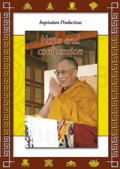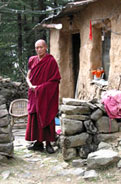|
Tenzin Gyatso, 14è Dalaï Lama of Tibet A western dictionary defines the word compassion as a sentiment which brings us to share our sufferings with others. An eastern dictionary defines the same word as a sentiment which brings us to consider that there is no difference between us and others and that all our actions should be dedicated for the welfare of others. There is a world of difference between these two definitions. We propose to take you to Asia to meet with people who considers "others before you". It is the world of Buddhism, the Tibetan people and their spiritual and temporal leader the 14th Dalai Lama. The present Dalai Lama, Tenzin Gyatso was born on the 6th July, 1935 in a poor farmer's family in Amdo, Tibet. At the age of two he was recognised as the 14th Dalai Lama. The Dalai Lama signifies "ocean of wisdom". Those who have this title are considered as manifestations of Buddha of compassion, Chenrezig in Tibetan. Installed in Lhasa as a "living god" he received education from the best teachers from different schools of Buddhism. He was about 15 years old when his country was invaded by China. He tried to negotiate with the invading forces through non-violent methods but finally in 1959 he was forced into exile followed by 80 000 refugees. Nehru gave him political asylum and land around Dharamsala at the foothill of Himalaya, 12 hours journey by bus from Delhi. He always lives in Dharamsala "a little Lhasa" where he has reconstituted his government in exile. His life is consecrated to his responsibility as a head of a state and a "simple monk" with 8 hours of dedication to meditation and to study of Buddhist philosophy. According to him any solution founded on the use of force is temporary "as disarmament exterior should be preceded by disarmament interior and exterior peace can be guaranteed only through our interior peace of mind." His unconditional commitment to peace has brought to him the international recognition by bestowing the Nobel Peace Prize in 1989. With his values, his charismas, his humble nature, warmth and good humour, he is one of the most well known personalities of the world. His conferences and teachings are followed by thousands of Buddhists as well as spectators who are in search of a life style with more meaning. His mastery over the complex thoughts of Buddhism is such that he emanates compassion to the whole community in Himalayan region. On compassion he explains: "in simple terms, compassion and love can be defined as positive thoughts and feelings that give rise to such essential things in life as hope, courage, determination and inner strength. Whatever the superficial differences that divide us: of races, of colours, of habits and of behaviours, in deep down we are all same, human beings. We all want happiness and do not want suffering. If you care for other's happiness it will bring more peace and happiness to you; on the other hand if you promote hatred and suffering on others it will finally bring more suffering to you. A mind full anger, jalousie, and hatred cannot be at peace… We must realise the fact that our very existence depend upon others. For instance, in the field of economy, in order for a country to develop its own economy, it is forced to take seriously into account the economic conditions of other countries as well. In fact, economic improvement in other countries will ultimately result in economic improvement in one's own country. In view of these facts about the modern world, we need a total revolution in our thinking and our habits. It is becoming clearer every day that a viable economic system must be based on a true sense of universal responsibility. In other words, what we need is a genuine commitment to the principles of universal brotherhood and sisterhood. This is not just a holy, moral, or religious ideal. Rather, it is the reality of our modern human existence…" We are going to make a documentary of 26' (and 52' of version international) around the personality of the Dalai Lama, his innumerable acts of compassion and practices made by renowned Buddhists around this theme. We have united, for the first time, personalities in our "first plan" who will relate their experiences. Their point of views on philosophy or their spiritual practice which brought change in their lives will be highlighted. Without any dogmatism, without following any religion or any ideology precise we can strive to become a good human being by eliminating what the Buddhists call the poisons of mind: jalousie, anger and hatred. |

